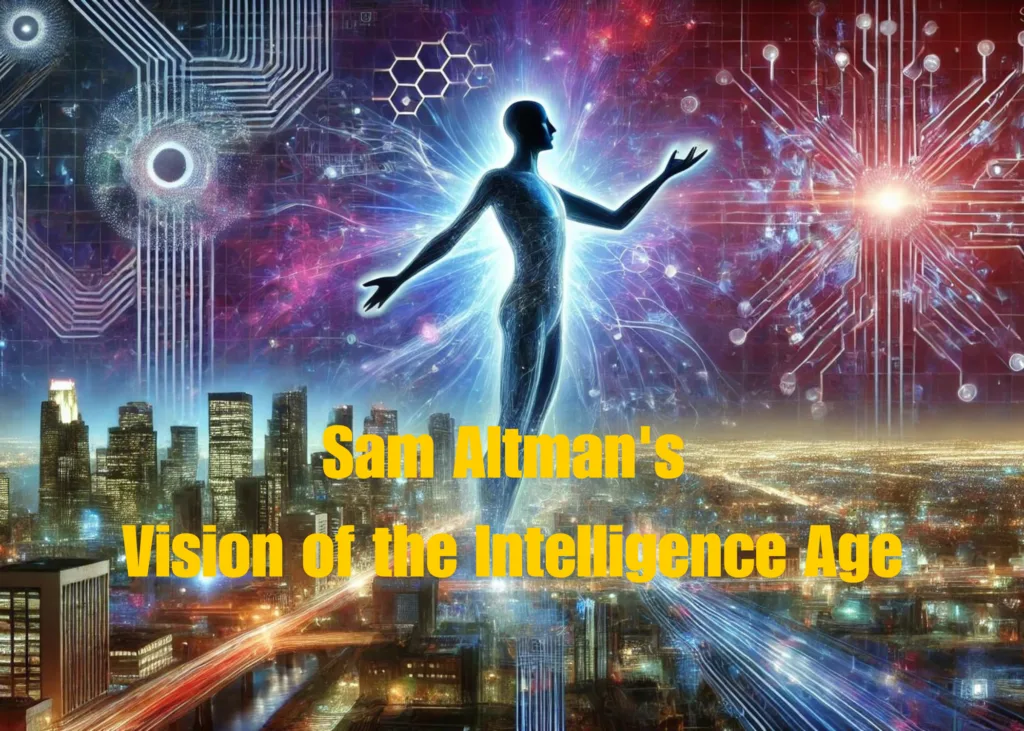Sam Altman, co-founder of OpenAI and one of the leading voices in the artificial intelligence (AI) space, envisions the onset of what he calls the “Intelligence Age.” In this era, AI is poised to not just augment human capabilities but revolutionize them entirely, offering transformative impacts across various sectors, from healthcare to education. However, this vision also brings with it profound challenges, particularly surrounding ethical concerns and labor market disruptions.
The Promise of AI: Healthcare, Education, and Beyond
Altman believes that AI’s true potential lies in its ability to amplify human productivity and foster innovations that were previously unimaginable. In healthcare, AI could revolutionize diagnostics, leading to faster, more accurate medical assessments, potentially saving millions of lives. Machine learning algorithms, for example, are already being used to detect early signs of diseases such as cancer or Alzheimer’s, offering hope for early intervention strategies.
Must read: OpenAI Introduces o1-Preview: A Leap Forward in Complex Problem Solving
In education, AI could democratize learning by offering personalized tutoring systems tailored to individual needs. This technology could bridge the gaps between different socioeconomic backgrounds, providing high-quality education to those in underserved regions. Imagine a world where every child has access to a personalized tutor, learning at their own pace and style, regardless of geographic location.
Challenges: Job Displacement and Inequality
However, Altman doesn’t shy away from acknowledging the downsides. One of the most immediate concerns is job displacement. As AI systems become more autonomous, millions of jobs—particularly those involving repetitive or manual tasks—are at risk of being automated. The impact on the labor market could be significant, leading to widespread unemployment unless new industries and roles emerge to absorb the displaced workforce.
Experts warn that without proactive measures, AI could exacerbate income inequality. As companies rush to adopt AI-driven efficiencies, wealth could become even more concentrated among those who own or develop these systems, leaving behind those who are less tech-savvy or adaptable.
Ethical Dilemmas: Responsible AI Development
Altman stresses the importance of ethical AI development. As AI becomes increasingly integrated into society, questions of transparency, bias, and misuse will only intensify. One ethical dilemma is how to ensure AI systems remain free from bias, especially in sectors like criminal justice or hiring, where biased algorithms could perpetuate discrimination.
Furthermore, the sheer power of AI systems presents risks if they fall into the wrong hands or are developed without sufficient oversight. Altman advocates for the responsible and regulated development of AI, ensuring that the technology benefits society as a whole rather than a select few. He argues that this responsibility rests on both policymakers and AI developers.
Expert Opinions: The Path Forward
Experts in AI and ethics echo Altman’s concerns and optimism. “AI could be one of the greatest tools for humanity,” says Dr. Kate Crawford, an AI ethics researcher, “but it must be wielded with caution, transparency, and inclusivity.” She believes that collaboration between governments, private companies, and civil society is crucial to establishing ethical guidelines that will govern the development and use of AI.
Another expert, Dr. Andrew Ng, emphasizes the need for re-skilling the workforce. “Job displacement is real, but it’s not the end of the story. If we can create robust retraining programs, we can harness the potential of AI while minimizing the social disruption.”
Shaping the Future: A Balanced Approach
Altman’s vision for the Intelligence Age is bold and sweeping, offering both opportunities and challenges. The transformative power of AI could indeed lead to unprecedented advances in human well-being, but it will require careful navigation. Governments, businesses, and individuals alike will need to adopt a balanced approach, ensuring that AI’s benefits are widely shared and its risks are mitigated.
Ultimately, the Intelligence Age may be the defining period of the 21st century, and how we manage its development will determine the future trajectory of humanity. The stakes couldn’t be higher, and now is the time to start making the right choices.




Pingback: OpenAI Launches OpenAI Academy - Buzz Feed Up